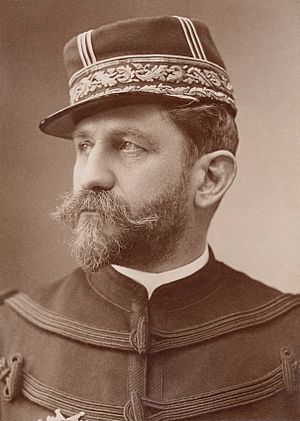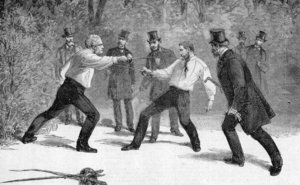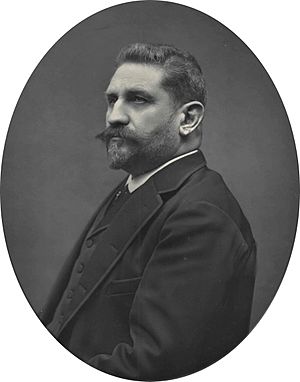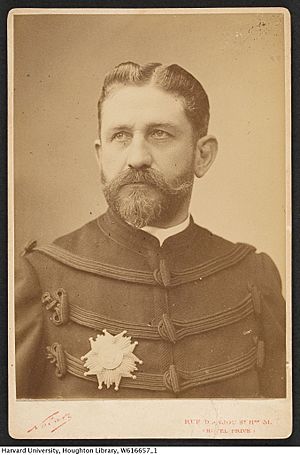Georges Ernest Boulanger facts for kids
Quick facts for kids
Georges Ernest Boulanger
|
|
|---|---|

Boulanger, photographed by Nadar
|
|
| Minister of War | |
| In office 7 January 1886 – 30 May 1887 |
|
| Prime Minister | Charles de Freycinet René Goblet |
| Preceded by | Jean-Baptiste Campenon |
| Succeeded by | Théophile Ferron |
| Member of the Chamber of Deputies | |
| In office 15 April 1888 – 12 July 1888 |
|
| Constituency | Nord |
| In office 19 August 1888 – 14 October 1889 |
|
| Constituency | Nord |
| Personal details | |
| Born | 29 April 1837 Rennes, France |
| Died | 30 September 1891 (aged 54) Brussels, Belgium |
| Resting place | Ixelles Cemetery, Brussels |
| Political party | League of Patriots |
| Spouses |
Lucie Renouard
(m. 1864–1891) |
| Children |
|
| Alma mater | École spéciale militaire de Saint-Cyr |
| Signature | |
| Nickname | Général Revanche |
| Military service | |
| Branch/service | French Army |
| Years of service | 1856–1888 |
| Rank | General of division |
| Battles/wars |
|
Georges Ernest Jean-Marie Boulanger (born April 29, 1837 – died September 30, 1891) was a French general and politician. People often called him Général Revanche, which means "General Revenge." He was very popular in France during the late 1800s.
At one point, in January 1889, many people thought he might become a dictator. He had strong support from working-class people in Paris and other cities. He also had support from traditional Catholics and royalists in the countryside. Boulanger believed in strong French pride, especially wanting revenge against Germany for France's defeat in the Franco-Prussian War (1870–71).
However, the elections in September 1889 were a big loss for Boulanger and his supporters. New laws stopped him from running in many areas. Also, the government strongly opposed him. When Boulanger left France on his own, his movement quickly lost power. This weakened the conservative and royalist groups in French politics for a long time.
Historians say that Boulanger's own weaknesses led to his movement's failure. Even though he was charming, he wasn't always calm or decisive. He was a fair leader but lacked a clear plan or courage. He couldn't unite all the different groups who supported him. Still, he made the Republicans worried, which caused them to become stronger and work together against him.
Contents
Early Life and Military Career
Georges Boulanger was born in Rennes, Brittany, France, on April 29, 1837. He was the youngest of three children. His father, Ernest Boulanger, was a lawyer. His mother, Mary-Ann Webb Griffith, was from a noble Welsh family. Georges's brother, Ernest, fought and died in the American Civil War.
After school, Boulanger joined the Saint-Cyr Military Academy in 1855. He became a soldier in the French Army in 1856.
First Battles and Promotions
Boulanger first fought in 1857 in Kabylia, during France's takeover of Algeria. He also fought in the Austro-Sardinian War, where he was wounded and received the Légion d'honneur medal. Later, he fought in the Cochinchina campaign and became a captain. He also worked as an instructor at Saint-Cyr.
During the Franco-Prussian War, Boulanger was known for being very brave. He was quickly promoted to chef de bataillon. He was wounded again while fighting near Paris during the Siege of Paris.
After the war, Boulanger helped the French government stop the Paris Commune in April–May 1871. He was wounded a third time while leading troops. He was promoted to commander of the Légion d'honneur. However, he was soon demoted because his position was temporary. His protest and resignation were not accepted.
Rising Through the Ranks
With help from his boss, Henri d'Orléans, Duke of Aumale, Boulanger became a brigadier-general in 1880. In 1882, the Minister of War, Jean-Baptiste Billot, made him director of infantry. This job allowed him to become known as a military reformer. He made changes to improve soldier morale and army efficiency.
In 1884, he became a general of division. He was put in charge of the army in Tunisia. But he was called back to Paris because he disagreed with the political leader there. Back in Paris, he started getting involved in politics with the help of Georges Clemenceau. In January 1886, Clemenceau helped Boulanger become the Minister of War. Clemenceau thought Boulanger was a republican, but Boulanger soon showed he was more conservative.
Becoming Minister of War
Boulanger became very popular as the Minister of War. He made improvements for soldiers, like allowing them to grow beards. He also appealed to the French people's desire for revenge against Imperial Germany. Because of this, people saw him as the person who would lead France to get its revenge, earning him the nickname Général Revanche. He also helped calm a big workers' strike in Decazeville.
A small problem happened when Philippe, comte de Paris, who was a possible heir to the French throne, married his daughter. This made some people worry about anti-Republican plans. The French parliament quickly passed a law to remove all possible royal claimants from France. Boulanger told d'Aumale that he was expelled from the army.
Boulanger gained public support after France's victory in the Sino-French War. This victory added Tonkin to France's colonial empire.
Military Innovations
Boulanger also pushed for the army to quickly adopt a new rifle. This rifle used a new type of smokeless powder called Poudre B, which was invented two years earlier. This new ammunition was very fast. However, the rifle itself, the Lebel Model 1886 rifle, became outdated faster than other European rifles. Boulanger also ordered a million rifles to be made by May 1887, but this goal was not realistic.
When the Prime Minister, Charles de Freycinet, lost power in December 1886, Boulanger stayed on as War Minister under René Goblet. Feeling confident, Boulanger started to challenge the Germans. He ordered military buildings to be built near the border. He also stopped horses from being sold to Germany and even banned performances of a German opera. Germany reacted by calling up over 70,000 reserve soldiers in February 1887.
After an event called the Schnaebele incident in April 1887, a war was avoided. Boulanger's supporters saw him as having won against Bismarck. However, for the government, Boulanger was becoming a problem. He argued with the Foreign Minister, Émile Flourens. On May 17, Goblet's government was voted out. The new Prime Minister, Maurice Rouvier, fired Boulanger on May 30.
The Rise of Boulangisme
The government was surprised when Boulanger received about 100,000 votes in an election in Seine, even though he wasn't even a candidate. To move him away from Paris, he was sent to command troops in Clermont-Ferrand. When he left on July 8, a crowd of ten thousand people rushed the train station. They covered his train with posters saying Il reviendra ("He will come back") and blocked the railway. But Boulanger was secretly taken out.
The general decided to create his own political movement, called Boulangisme. This movement brought together different groups who were unhappy with the government. It focused on three main ideas: Revanche (revenge on Germany), Révision (changing the constitution), and Restauration (bringing back the monarchy). Important conservative figures, like Count Arthur Dillon and Duchess of Uzès, who gave him a lot of money, supported this new movement.
Growing Popularity
The government became unpopular after a scandal involving President Jules Grévy's son-in-law, Daniel Wilson, who was secretly selling Légion d'honneur medals. This made Boulanger even more popular. When President Grévy had to resign because of the scandal, Boulanger's position became very important. In January 1888, his supporters promised to back any presidential candidate who would make Boulanger the Minister of War. The crisis ended when Sadi Carnot was elected president and Pierre Tirard became Prime Minister. Tirard refused to include Boulanger in his government.
During this time, Boulanger was in Switzerland, where he met Jerome Napoleon Bonaparte II, a supporter of the Bonaparte family. He offered his full support to Boulanger. Even the Comte de Paris, a royalist leader, told his followers to support Boulanger. Boulanger, who was once seen as a republican, now showed his true leanings by joining the conservative monarchists. On March 26, 1888, he was removed from the army. The next day, Daniel Wilson's imprisonment was canceled. It seemed to the French people that honorable generals were punished while corrupt politicians were not, which made Boulanger even more popular.

Even though he was a military man and not legally allowed to run for the French Chamber of Deputies, Boulanger ran in seven different areas in 1888 with support from the Bonapartists. Many of his supporters were elected to the Chamber. On July 12, the day they were sworn in, a large crowd came with them. Boulanger himself was elected in the constituency of Nord. However, Boulanger and his supporters were still a minority in the Chamber. Since he couldn't pass laws, he focused on keeping his public image strong. Even when he failed as a speaker or lost a duel to Charles Thomas Floquet, a much older civilian and Minister of the Interior, his supporters' excitement did not lessen.
In 1888, Boulanger was the most important figure in French politics. When he resigned his seat to protest how his ideas were received, different areas competed to elect him again. A popular song, C'est Boulanger qu'il nous faut ("Boulanger is the One We Need"), was about him. He and his black horse became very popular in Paris, and people urged him to run for president. Boulanger agreed, but his desire for power soon made his republican supporters wary. They saw him as a possible military dictator. Many monarchists continued to give him money, even though Boulanger saw himself as a leader, not someone who would bring back kings.
Downfall

In January 1889, Boulanger ran for a deputy position in Paris. After a strong campaign, he won with 244,000 votes, much more than his opponent's 160,000. Many of his supporters thought a coup d'état (a sudden takeover of the government) was likely and wanted it to happen. Boulanger had become a real threat to the French Republic. If he had immediately led a revolt on January 27, he might have succeeded. But he hesitated. According to Lady Randolph Churchill, he was focused on his girlfriend, Madame Bonnemain, and couldn't be found.
Boulanger decided it would be better to run in the general election and try to gain power legally. However, this gave his enemies time to act. Ernest Constans, the Minister of the Interior, started an investigation. He attacked the Ligue des Patriotes using a law against secret societies.
Soon after, the French government issued a warrant for Boulanger's arrest for plotting against the government. To the surprise of his supporters, he fled Paris on April 1 before he could be arrested. He went first to Brussels and then to London. On April 4, the Parliament took away his immunity from prosecution. The French Senate found him and his supporters, Rochefort and Count Dillon, guilty of plotting against the state. They were sentenced to be sent away and confined.
After he fled, support for Boulanger quickly disappeared. His supporters lost badly in the general elections of July 1889 because the government had forbidden Boulanger from running.
Later Life and Death
Georges Boulanger died on September 30, 1891, in Brussels, Belgium. He was buried in the Ixelles Cemetery in Brussels, in the same grave as his girlfriend, Madame Bonnemain.
Images for kids
See also
 In Spanish: Georges Boulanger para niños
In Spanish: Georges Boulanger para niños


